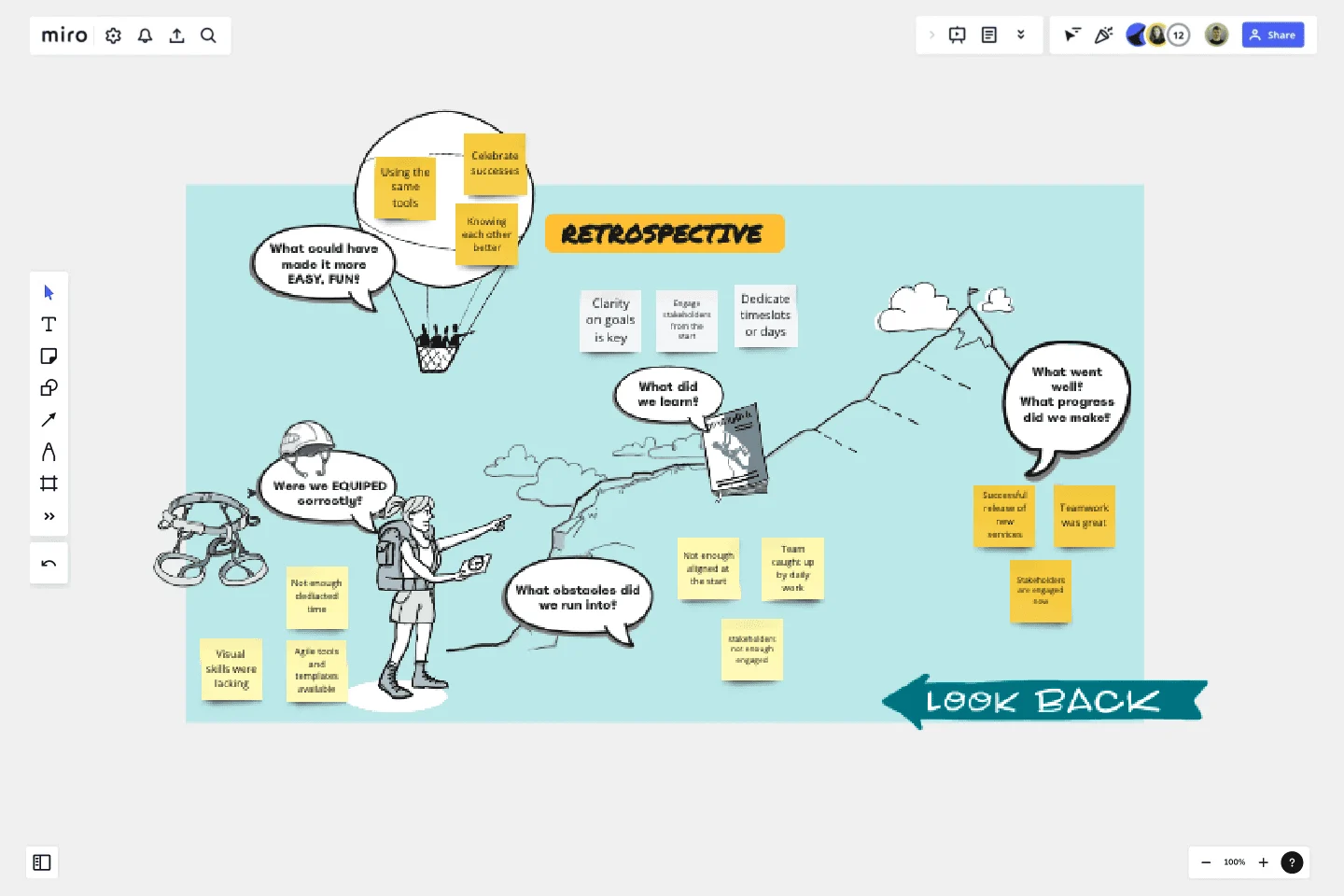Retrospective by Axelle Vanquaillie
Retrospective means looking back. This retrospective template helps teams to reflect on what worked well, what didn't work well, and what they learned. In this template, we added a few other aspects, more specifically, the equipment, the atmosphere, etc...
The value of a retrospective lies in the initiatives and actions that follow the reflection and improve the team's performance sustainably.
5 tips for running a retrospective meeting:
1. Install a safe environment. Like with every team reflection exercise, ensuring a climate of psychological safety is crucial. Make sure everyone is and feels involved. Focus on learning and not on blaming. And agree on the confidentiality of the meeting: what happens there stays there.
2. Organize individual reflection and allow people to talk in pairs first before sharing with the larger group. Discuss the pain points, learnings, achievements, etc... theme per theme, and make sure every voice has been heard.
3. Start with the aspects that went well. Starting strong brings positive energy and helps you through the harder nuts to crack.
4. Help the team switch from problems to solutions by defining the learnings immediately after framing the obstacles.
5. Go from solution to action. Agree on which steps need to be taken and hold each other accountable. Make the actions and next steps feasible so you can celebrate successes.
This template was created by Axelle Vanquaillie.
Get started with this template right now.
Taco Tuesday Retrospective
Works best for:
Agile Methodology, Retrospectives, Meetings
The Taco Tuesday Retrospective template offers a fun and informal approach to retrospectives, perfect for fostering team camaraderie. It provides elements for reflecting on past iterations over a casual taco-themed gathering. This template enables teams to relax, share insights, and brainstorm ideas in a laid-back atmosphere. By promoting social interaction and creativity, the Taco Tuesday Retrospective empowers teams to strengthen relationships, boost morale, and drive continuous improvement effectively.
Agile Retrospective
Works best for:
Retrosprective, Agile Methodology, Meetings
The Agile Retrospective template offers a dynamic and adaptive framework for teams practicing agile methodologies. It provides elements for reflecting on sprint performance, identifying bottlenecks, and planning improvements. This template enables teams to adapt and refine their processes continuously, fostering a culture of learning and innovation. By promoting agility and adaptability, the Agile Retrospective empowers teams to optimize their workflows, drive continuous improvement, and deliver value to their stakeholders effectively.
Reflection Island: End of Year Team Retro
Works best for:
Retrospectives, Agile Methodology, Meetings
The Reflection Island: End of Year Team Retro template offers a creative and themed approach to retrospectives, perfect for wrapping up the year. It provides elements for reflecting on achievements, challenges, and goals using a tropical island theme. This template enables teams to celebrate successes, learn from setbacks, and set intentions for the upcoming year in a relaxed and enjoyable atmosphere. By promoting reflection and celebration, the Reflection Island: End of Year Team Retro empowers teams to strengthen bonds, boost morale, and start the new year with renewed energy and focus effectively.
Starfish Retrospective
Works best for:
Retrospectives, Agile Methodology, Meetings
The Starfish Retrospective template offers a structured approach to retrospectives using the metaphor of a starfish. It provides elements for identifying what to start, stop, continue, do more of, and do less of. This template enables teams to reflect on past iterations, identify actionable insights, and prioritize improvements. By promoting clarity and focus, the Starfish Retrospective empowers teams to drive meaningful change and continuous improvement effectively.
What? So What? Now What? Template
Works best for:
Agile Workflows, Retrospectives, Brainstorming
The What? So What? Now What? Framework empowers you to uncover gaps in your understanding and learn from others’ perspectives. You can use the What? So What? Now What? Template to guide yourself or a group through a reflection exercise. Begin by thinking of a specific event or situation. During each phase, ask guiding questions to help participants reflect on their thoughts and experience. Working with your team, you can then utilize the template to record your ideas and to guide the experience.
Christmas Retrospective
Works best for:
Agile Methodology, Meetings, Retrospectives
The Christmas Retrospective template offers a festive and celebratory approach to retrospectives, incorporating the holiday spirit into the session. It provides elements for reflecting on achievements, sharing gratitude, and setting intentions for the future. This template fosters a sense of warmth, togetherness, and appreciation among team members, encouraging reflection on both professional and personal growth. By infusing the retrospective with the joy of the holiday season, the Christmas Retrospective empowers teams to strengthen relationships, cultivate positivity, and drive continuous improvement effectively.
